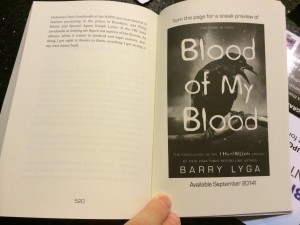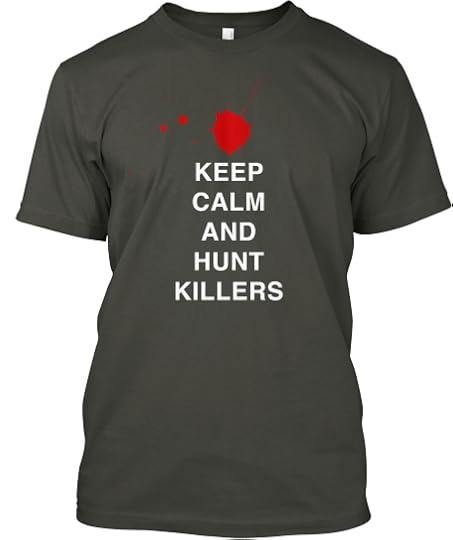Barry Lyga's Blog: The BLog, page 45
June 19, 2014
Lazer Wars: Episode 2 — The Writer Strikes Back
When last we “spoke,” I had just been offered one of my first serious writing gigs: Developing the backstory for a brand-new science fiction toyline, along with writing an in-pack comic book to convey said backstory.
The problem, though, was that I had no idea how to produce a comic book. I could write one, sure, but I didn’t know anything about the production process. I went home and called up my buddy Jeff Vaughn, who worked with me at one of Diamond’s sister companies. I cheerfully broke my NDA and told him about my trip to New York.
“But it’s not gonna happen,” I said.
“Why not?”
“They want me to hand them a finished comic book. There’s no way I can do all of that.”
Jeff spluttered with frustration and indignation. “You idiot! If you throw away this opportunity over that, I’ll kill you! I know how to produce a comic book. Bring me on board and I’ll handle everything.”
I wasn’t sure if the Toy Island guys would go for that, but I figured it was worth a shot. I called them up and they were fine with me bringing in an overseer. Now the only question was: What would I get paid?
This was long, long before I had an agent. I had written a handful of comic books, but in those instances the publisher had just told me, “Here’s your page rate and here’s your royalty; take it or leave it.” I’d taken it.
But now I was supposed to tell them what I wanted to be paid.
I still remember negotiating that deal. I was petrified. I was somewhere in my mid-twenties and this was my first serious writing opportunity. I didn’t want to blow it. I also didn’t want to get screwed over. The money guy from Toy Island (his name was Barry, too) was actually sort of gentle, saying to me, “Just tell me how much money. I’m not going to hang up on you.”
Still, even with that assurance, I hemmed and hawed and stuttered for a good ten minutes before I finally revealed that I wanted ten thousand dollars to develop the backstory and to write the comic. He chuckled kindly and said, “We can’t do that. How about five thousand?”
Five thousand dollars to write what ended up being an 11-page comic. That was over $450 a page. At the time, that made my page-rate better than Alan Moore’s! I readily accepted.
Then I put them in touch with Jeff, who negotiated his own deal as a sort of packager — he would get the art together and have the book colored and lettered. I’m pretty sure everyone else on the deal made a hell of a lot less than I did, even though their parts in it all were much more labor-intensive. Still, it was a new venture and it seemed promising and — most important of all — we all had a blast.
I put together some thoughts for the story and as soon as I submitted it, I realized that I loved the ideas too much. I wanted to write a novel about those characters. So when the Toy Island guys came back and said, “This isn’t exactly what we’re looking for,” I was relieved. They then sent me sketches of the toys and I came up with a second notion. This one, they absolutely loved. Here’s the basics of it:
Elsewhere in the galaxy, a group of rebels overthrow the tyrant who rules the Obsidian Empire. During the revolution, the tyrant’s “war chief,” Em Grosser, is critically injured. Near death, Grosser is rescued by his automatons, who drag him to his spaceship and flee the Empire. They repair him with cybernetics and wander the galaxy for years, encountering many strange alien races.
Then they come across Mars. It’s the perfect base from which Grosser can churn out his “shockbot” army…and mount an assault on an unsuspecting Earth. Once Earth is his, he can use its resources to expand his army and recapture the Obsidian Empire.
But the Mars Pathfinder mission (remember, this was the 1990s!) has spotted Grosser’s operations, and the U.S. sends its elite, top-secret Lazer Corps to Mars. Led by Colonel Chance, the Corps includes Howard Brett and Vaughn Jace, as well as a robotic assistant, H.I.R.A.M.1
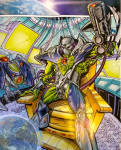
Em Grosser, the villain of LAZER WARS
I named the villain after a guy I worked with, Marty Grosser, who was a huge toy collector. Howard Brett (codename: Howitzer) was one of my college roommates, with his name flipped. And Vaughn Jace (codename: Flyboy), of course, was Jeff Vaughn, who often went by J.C. Vaughn. I don’t know where I came up with the term “shockbots,” but I still like it, to be honest!
At the last minute, the toy guys came up with another character, a very alien-looking one. There was no time to put him into the comic itself, but we could mention him, and at the very least he needed a name. I called him Brador Ttosc, again mangling the name of a friend.
At this point, we hadn’t seen a single toy. All we had to go on were production sketches, and they looked terrific. The guys were really living up to their goal of producing McFarlane-level detail and sculpting with a sci-fi aesthetic.
Jeff assembled an artist, colorist, and letterer for the comic, as well as a graphic designer. I put the finishing touches on the script and sent it over to him, and soon enough, we had a comic book!
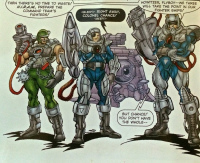
The Lazer Corps, Earth’s elite defense unit.
It ended up looking great. I was so happy with it. Considering that it was a toy for kids, I managed to be a little subversive. There’s a blood slick when a character’s body is dragged away, for example, and I made sure to have a close-up of a character smoking a cigar. (This was smack in the middle of the Clinton impeachment, so cigars were extremely loaded images at the time.) I was having a ball, and so was Jeff.
The guys at Toy Island were thrilled. They told us to start thinking about characters and scenarios for a second series of toys. They also mentioned that they were in talks to possibly spin the toy line into an animated TV series. Jeff and I, of course, would be involved in that. We had dollar signs and success dancing before our eyes.

Me gettin’ all political, as the General smokes a stogie.
Well, given that you know me as the author of YA novels and not as a toy/animation guru, you can imagine that this all fell apart. And it did. Hilariously.
And, yeah, I’m gonna leave you hanging on that cliff for now. Come back tomorrow for the conclusion to this trilogy!
Human Interface, Robotic Assistance MechanismSadly, I no longer seem to have any of the original paperwork or faxed sketches, but I seem to recall this last one coming in with “Do you have a name for this scary fellow?” written on it.
June 18, 2014
Blood of My Blood: Excerpts
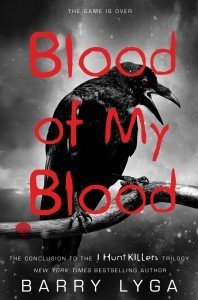 Last week, I offered newsletter subscribers the first sneak peek at Blood of My Blood. And now I present it to BLog readers, as well!
Last week, I offered newsletter subscribers the first sneak peek at Blood of My Blood. And now I present it to BLog readers, as well!
Almost anything from this book could be a big spoiler, so I decided that — rather than choose the first X number of pages as an excerpt — I would instead offer bits and pieces from throughout the book in no particular order…without telling you where in the book these bits take place!
This way, you’ll get a taste of the book, but without too much being spoiled.
There will be more excerpts in the July and August newsletters (so sign up!), but also keep an eye here on the BLog, my Tumblr, and Facebook!
And now, with no further ado…
He had to rely on himself.
That’s the way it’s s’sposed to be, Jazz heard Billy say in his head.
He hated it when his father told the truth.
On his way out of town, he drove past the Coff-E-Shop. Which naturally made him think of poor Helen Myerson. She’d been their usual waitress and had good-naturedly whipped up any number of outright bizarre concoctions Howie demanded. And then the Impressionist had killed her, and that was the end of Helen, and now that Howie thought about it, he hadn’t been back to the Coff-E-Shop since.
I am way too young, he thought, to have so many dead people in my life.
The sooner done, the better. While he longed to take his time and give each of them the personal touch, he knew a horribly murdered wife and children would only cast suspicion on the missing, surviving father. It was always the way. The world always blamed men, when it was truly the women who were at fault. The women, who held themselves back and above. The women, who tempted and taunted.
So Hershey planned a meticulous tragedy involving the apartment’s gas stove. It was possible that people in the apartment below might meet their end as well — he was unsure exactly how big the explosion would be — but the collateral damage would make the “accident” move believable.
Connie didn’t want to beg for her life. She didn’t want to do that. But she would. She knew it. She could feel it crawling up her throat like something that hadn’t quite been dead when she’d eaten it. She would whimper. And cry. Her nose would run streamers of snot. And it would be useless because that was the sort of thing you did to play on someone’s pity, but Billy Dent had no pity. He was born without it, the way some people were born without detached earlobes or the ability to curl their tongues. Her tears and her pleas would do nothing to him, and she knew it, but she wouldn’t be able to stop herself. She would beg and wheedle and swear and importune, and in the end, he would do horrible, horrible things to her anyway.
Whew! OK, that’s it for now! There’s your taste(s) of Blood of My Blood, available September 9. You can preorder from Barnes & Noble, iBooks, and your local independent bookstore. (Not Amazon, sadly.)
Keep your eyes open: More will come soon!
Lazer Wars
Most people know that I got my start in the comic book business. I don’t talk a lot about those comics that I wrote in the early days because the experience was…suboptimal. Make no mistake — the fault for this is almost entirely (like, 99.9%) mine. I was young, brash, opinionated…and wordy as hell. Not a good mix for a comic book writer.
What most people don’t know, though, is that early on I plied my writing skills in service of a toy company, too. I’ve never really told this story, so I figured why not do it now?
Here’s how it happened: I was slaving away at Diamond Comic Distributors when one day my friend Chuck Terceira (at the time a minor Purchasing drone, but now the President of Diamond Select Toys) came over to my humble cubicle.
“Hey, you write, right?”
“Well, yeah.” At this point, I had very little under my belt, but so what?
“I know some guys who are starting up a toy line and they want someone to write something for them. You interested?”
At that point in my life/career, I would have jumped at the chance to write fortune cookies. I said yes.
Chuck put me in touch with the guys at Toy Island. One of their founders had been a big-wig at Mattel, guiding the Barbie line. Now these guys were launching their own toy business.
Realize that this was the 1990s. The idea of independent toy companies was new and flowering, thanks in part to the runaway success of Todd McFarlane’s upstart Todd Toys (later McFarlane Toys). I was intrigued by the idea of being on the ground floor of something creative and new.
So, I hopped on a train to New York and met with the two principals at Toy Island. For the first time in my life, I was asked to sign an NDA. That out of the way, they explained their plan.
“You’ve heard of Todd McFarlane?” they asked.
Well, duh. I worked in the comics biz. Of course I had.
“You know how he’s revolutionized toys?” they asked. “With all of that crazy detailing?”
For those of you who don’t know, they were talking about toys like these:
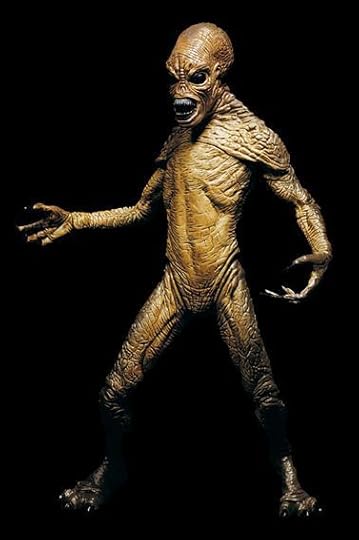
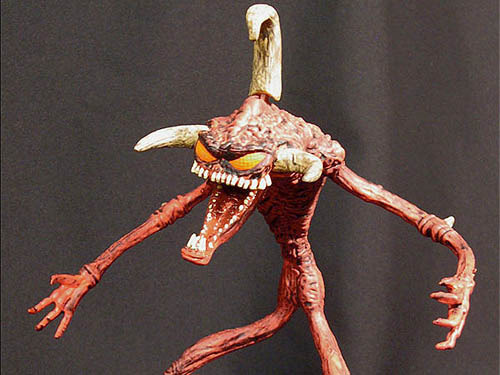
At the time, that level of detail was insane. We take it for granted now, but McFarlane Toys was pretty much at the vanguard of hyperrealistic detail in toys, similar to the way Image Comics at the time was at the forefront of over-rendered detail in comics. It was new and exciting and no one else was doing it.
For comparison, Star Wars toys looked like this in the 1990s: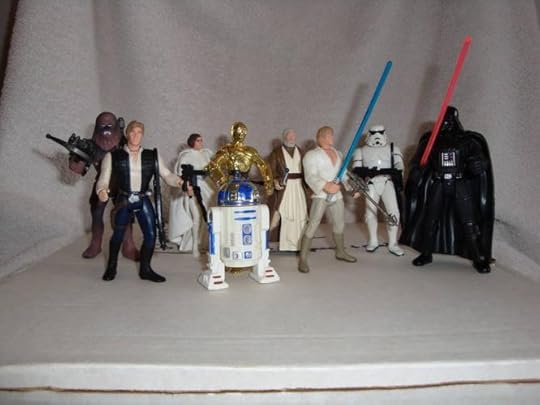
Not bad, but nowhere near the level of sculpting and detail in the McFarlane Toys. This was a scrubby little startup showing the big boys how to do their own jobs.
And now the Toy Island guys wanted in. Their plan was to apply a McFarlane-esque level of detail to science fiction toys. (McFarlane was focused on horror and fantasy, mainly.) With a new Star Wars movie on the horizon, the boys toy market was understocked. Everyone knew that the new Star Wars toys would dominate, so the major toy companies weren’t producing any sort of sci-fi toys.
Toy Island wanted to take advantage of the lull with a new line that would come from nowhere. For a period of several months, the only sci-fi toys on shelves would be theirs. Until Star Wars came along, of course. But by then, they would have established themselves and their brand. Not a bad plan.
But there was more. And this was the crux of the need to sign an NDA.
“We’ve developed a whole new toy technology,” they told me. “These toys shoot each other.”
“Excuse me?” I asked.
“They shoot each other. One fires a beam at another, and the one that was hit screams and falls over.”
It took me a moment to digest this. Because it sounded like he’d said that these toys could shoot each other and react to being shot. Which was clearly impossible.
“Let me make sure I understand this,” I said. “I can take one toy and set it up on a table and take another one from a distance away and aim its gun and push a button and the toy on the table will fall over.”
“Scream and fall over,” they clarified.
“Because it was shot.”
“Yes, because it was shot.”
“With a beam of some kind.”
“Yes, a light beam.”
“A visible beam of light.” I wanted to be sure of this. Remember this part, Dear Reader; it will be important later on.
“A visible beam of light,” they confirmed. “It shoots out of one toy and hits the other toy…”
“And the other toy screams and falls down.”
“Exactly.”
Ho. Lee. Shit.
This wasn’t just a cool toy — this was groundbreaking. Game-changing. No more running back and forth between your toys to knock ‘em over. No more yelling with your friends over who got shot and who didn’t. Actual beams of light flashing back and forth between your toys, just like in the movies!
Yeah, I was on-board.
What they needed from me, they said, was a story. They had the technology and the toys, but they needed those toys to have names and motivations. There had to be a backstory, one with dangling threads that kids could pick up to playact with. I would write a comic book, they told me, one that would set up the characters and the history, ending with a dramatic hook that kids would hang their own stories on.
Great. Sounded terrific.
The only problem was this: They also wanted me to produce the entire comic from soup to nuts. Not just the story, but also the art, coloring, lettering…
And I had no idea how to do that.
Come back tomorrow for Part 2 of our story, as Young Barry exploits his friends…
June 17, 2014
GAME: Now in Paperback!
Get ready, folks — it’s Game Day!
No, I’m not talking about the World Cup. I’m talking about Game!
The sequel to I Hunt Killers is now available in glorious paperback. Those of you who don’t buy hardcovers, now’s your chance!
Oh, and there’s a little something extra in this edition…
That’s right — after Game is over, you get a sneak peek at Blood of My Blood! The first 16 pages!
You can find Game in paperback at all the usual places: your local bookstore, Barnes & Noble, Books-A-Million… (Strangely, you can even find it at Amazon! They’re still being buttheads, though, about my publisher’s books — and mine — so I encourage you to buy it elsewhere, if you can.)
And hey: Here’s a list of a few wonderful independent bookstores that will happily sell you the book online. You don’t even have to leave the sofa!
Powell’s
river’s end bookstore
Mysterious Galaxy
WORD
Murder by the Book
June 14, 2014
This Week’s Tumblr – June 14, 2014
Here’s what I posted recently on Tumblr…
"a bunny is the cutest fucking animal in the world"
Video Excerpts from my Piper Institute Interview
your link to the teespring order page doesn't work

Here it is, the I Hunt Killers t-shirt!
I didn’t want something…
malindalo:
The intersection of narcissism and self-doubt is…
hodgman:
I am in a new TV show called “Married,” which will…
"It has become fashionable in some circles to deride book publishers as out-dated, out-classed…"
First Excerpt from BLOOD OF MY BLOOD
jonnyskov:
arcaneimages:
They Live
I need to watch this…
jonnyskov:
The next Shut Up & Write panel, with very…
Taking a Break — Barry Lyga Dot Com
Keke Palmer as Connie Hall?
novartely:
Jasper Dent, one of my all time favourite characters…
Digest powered by RSS Digest
June 12, 2014
Interview: Piper Institute
Way back in November 2012, the folks at the Piper Institute (a writing institute in Arizona) conducted an interview with me about I Hunt Killers. Below are four video excerpts from that interview, in which I briefly discourse on the origins on the story, the process of writing it, the choice of POV, and whether I had to kill any darlings along with the victims.
(Side note: I was slightly horrified by my posture while watching these. Then I remembered that in November 2012, I was on crutches due to a broken foot and so I was probably slumped down in the chair to keep my foot elevated. Posture fanatics and ergonomic experts, please forgive me!!!)
Excerpt 1: How the Story Started
Excerpt 2: Narrative POV
Excerpt 3: Outlining
Excerpt 4: Kill Your Darlings
June 11, 2014
The I HUNT KILLERS T-Shirt
A little while back, I asked folks on Twitter and Tumblr if they would be interested in an I Hunt Killers t-shirt. The response was, basically, “Yeah, dude!”
So…
I didn’t want something that seemed “branded.” I’m not interested in turning fans into walking billboards for my work. So I came up with something that seemed to conflate pop culture, the books, the attitude of the characters, and my own twisted psyche, and came up with…
Not bad, eh?
You can order the shirt over at Teespring. Here’s how it works: It’s sort of like Kickstarter for clothes. If at least 25 people order the shirt by June 25, it will be printed up and sent to you. If 25 people don’t order, the shirts won’t be made and you won’t be charged.
(Why did I do it this way? Simple: To keep costs down.)
So, if you want the shirt, order it now. (Also available in Women’s Junior Fit!)
And remember: Keep calm and hunt killers!
June 10, 2014
What Use, Publishers?
I had planned for a while to write something about the current contretemps between Amazon and my publisher, Hachette, but people like Peter Brown, Stephen Colbert, and Farhad Manjoo have said what I would have said, most likely with better clarity and more sense. So I urge you read their pieces.
There is one chunk of the discussion, though, that I wanted to weigh in on. And that has to do with the utility and necessity (and, perhaps, lack thereof) of publishers in general.
It has become fashionable in some circles to deride book publishers as out-dated, out-classed dinosaurs ripe for digital disruption. They are Old Media in a world of New Media, the claims go. They are holding authors back, ripping them off for a too-large percentage of the price of each book, offering little in return. For these crimes, they deserve to be sentenced to death.
What will replace them? Why, self-publishing, of course! Self-publishing is the Authorial Promised Land — no editors telling you what to do, no Sales team determining your placement in the catalog, no Marketing group telling you that promoting your book just isn’t in the budget…
It actually sounds great. And that’s mostly because, quite frankly, it is pretty great. There’s nothing wrong with self-publishing and quite a lot right about it. If you’re looking for me to beat up on self-publishing, you’ve come to the wrong place.
But I’m not going to beat up on publishers, either. And I don’t understand those who do.
Sure, publishing is more than slightly hidebound and needs to have the engine checked, but tossing it overboard entirely is the worst sort of overkill. As someone who has self-published, I have never understood the zeal of some of my fellow self-publishers for burning the publishers to the ground. It borders on a religious mania sometimes. Look, a publisher is a means to an end, a distribution network for art. If it doesn’t work for you, then use something else. You have that option, as we all know. But why continue railing and fulminating against the model you eschew? It is truly, truly bizarre to see successful, wealthy people continue to pick at a scab that clearly bothers them so.
You won. You self-published and made a mint. Enjoy it! Sometimes folks sound like that crazy ex who can’t stop calling and texting to tell you how great his/her life is now.
“But Barry, those evil publishers are taking advantage of my fellow authors and I must do something!”
*sigh*
Look, there are trade-offs in every decision and down every path. If you choose self-publishing, you do so without an infrastructure of support. By and large, you have to learn on your own every little thing. When I self-pubbed Unsoul’d, I had to trawl (not troll!) a million forums and message boards to figure out certain things…and there were some aspects of the biz that I just gave up on because the information/advice was so thin and/or contradictory.
I still self-pubbed, though. Because I wanted to. And because — for Unsoul’d — the advantages outweighed the disadvantages.
For other projects, the advantages of a publisher outweigh the disadvantages.
And yes, sure, of course there are disadvantages to a publisher. There are things about my publisher I would love to change, things I am fighting to change. But that doesn’t mean I discard them, any more than the disadvantages of self-publishing make me dismiss that avenue out of hand.
What value do publishers bring? I’ll tell you. Here is a very small thing my publisher did for me that turned out to be a very big thing: When Little Brown bought the I Hunt Killers series, they revealed that information in a press release announcing their acquisition of Libba Bray’s much-anticipated The Diviners.
At the time, I was a schlub. Libba was the multiple New York Times bestselling author of the Gemma Doyle trilogy who had just won the Printz Award for Going Bovine. She was (and is!) a Big Deal. I was not. But by including me in that press release, Little Brown instantly did something I could not have possibly done: They raised my profile in the industry. By adding me into that press release, they were saying to the industry, “Hey, look, we think this Barry Lyga guy is important enough to merit your attention. We’re excited about what he’s got up his sleeve, and we want to make sure you know about it.” They put me in front of an audience of booksellers and industry gatekeepers who otherwise might have ignored my new series.
That’s value. Now, we can argue over how much value it is, sure. We can argue about whether Little Brown deserves to make as much as they’ve made from Killers and its sequels, but we can’t argue over the fact that it is valuable.
So we’re left to worry about the details. That’s fine. I don’t mind haggling over details. But that’s what we’re doing — we’re tweaking. We’re adjusting. Not burning to the ground.
Maybe I “get” both sides of the coin because I originally came from the comic book business. In comics, there is a large, thriving, respected self-publishing tradition. There’s no shame or stigma attached to it, as there has been in book publishing, so self-publishers long ago divested themselves of the weighty chips on their shoulders. No one is calling for, say, DC or Marvel to be driven out of business by a capricious Amazon.com. They just go about their business, creating great comics.
We can — and do! — have it both ways.
“Publishers are fine, for what they do,” the argument goes, “but they get too much money. They shouldn’t get 85% of your book in perpetuity. They should be paid a flat fee for their work.”
Well… Look, I’m the first one to raise my hand and say that royalties can be higher. That’s what my agent is for — she negotiates my royalty rate with every contract and wrings every penny she can out of the system.
But if “traditional” publishing collapses and self-publishing is the only option and publishers become guns-for-hire, then the reading public will suffer. Dramatically. You think diversity is lacking now? In a world of publishers-for-hire, we will behold an even more rigidly defined caste system, in which only people with money are able to write and succeed, and everyone else is out of luck.
Because to pay a publisher a “flat fee” for the work it does requires up-front money. Right now, can you afford to hire an editor? A cover designer? A proofreader? A copyeditor? Can you afford to license fonts? Can you afford to hire someone with the good taste to tell you which fonts to use?
“Those things aren’t that expensive.” You forget: I’ve done this, too. Good, talented people in these fields aren’t cheap, and “aren’t that expensive” is the motto of the privileged middle class. Where will the next voices from our impoverished communities come from if they have to pay even the paltry sum of a couple hundred dollars for a cover? That might not sound like much to someone who has already succeeded as an author or to someone with a stable day job, but what about the poor (literally) writer who is a genius, but can’t scrape together enough for rent, much less to hire a publisher?
(If you think I’m exaggerating, I urge you to do a little research on the subject. Poverty is no indicator of poor artistic vision; what brilliant works have we missed as a culture due to a lack of postage or a monthly internet fee? Here’s only one example of the depth of the problem: The Speculative Literature Foundation has a grant to help impoverished writers become authors.)
“You can barter for those sorts of services.” Um, OK. That might be true, but then you’re consigning professional designers and editors to a career based in barter. Does that seem viable? You’re going to lose a lot of good, talented people that way. The landlord doesn’t take “I designed a cover for this guy and he wrote me a great letter about why I can’t pay my rent” to the bank.
Publishers subsidize art. We can argue about the relative fairness of their business models (and hey — I have some bones to pick there, too), but I’m looking at the system as a whole. A publishing model with publishers can make it possible to hear voices we wouldn’t hear otherwise. Which, funnily enough, is something self-publishing excels at as well, only in different directions.
So…maybe we can have both? And stop throwing grenades at one another?
And maybe — just maybe — we can all look at the current Amazon situation dispassionately and agree that even if Amazon has done some wonderful things for readers and authors, that it deserves the same exacting, penetrating analysis we give to our royalty statements, our industry as a whole, and — hell — our work.
June 9, 2014
Taking a Break

What I’m about to write won’t mean much to most of you. But I know that a lot of would-be authors read the BLog, looking for writing advice or insight into the writing life, so here goes:
Like poor Ross, I’m going to take a break. Unlike Ross, mine will not involve the hot girl at the copy place.
“Take a break from what?” you ask. And I reply, “From writing.”
In the last five years, I have written well over a million words. For comparison, figure that the average novel weighs in at roughly 87,000 words.
In five years, I’ve written the equivalent of around eleven and a half novels. I’ve published seven novels, a graphic novel, and a novella. There are three more novels coming out over the next year or so, as well as The Book That Will Kill Me, which is huge and still waiting for a publisher to believe in it.
In the last year alone, I’ve written Blood of My Blood and Lucky Day, as well as my collaboration with Peter Facinelli and Rob DeFranco, After the Red Rain (which, being a collaboration, required a level of rewriting and revising I’d never, ever attempted before). I’ve also written a kick-ass middle grade novel that hasn’t been announced yet, one that I am so excited about and can’t wait to see in print.
But man oh man — I’m beat. I am tired.
It’s been said that writing ain’t ditch-digging, and that’s true. Go ahead and boo-hoo me and hashtag me with firstworldproblems and whatever else you’d like to do, but the fact of the matter is that if you do anything at the unrelenting, uncompromising pace I’ve written in the last few years… Anything done that long at that level will burn you out.
I’m tired. I need a break.
I’ve always said that I will write books until I die, and that’s still the case. I’m just going on hiatus for a little while, to recharge my batteries and regain my sanity and my perspective. When all you do is write, write, write, and write for months and years without a break, you start to lose the ability to tell what is good and what isn’t. You start to question yourself in ways that may not be healthy…and at the same time, you develop a tendency to dig in when maybe you shouldn’t.
So if you see me out in the world (like at this event later this month) and you ask me that audience favorite — “What are you working on right now?” — the answer will be “Nothing.”
What will I be doing? Well, I don’t plan to just sit around playing video games. I’m not 100% sure yet. I may take piano lessons. I might learn how to code — I’ve always wanted to write an app. I want to think about it a little bit. If you have suggestions for stuff I might be able to do in my sudden free time, feel free to post ‘em in the comments below.
There’s no particular deadline for this hiatus. I’ve lived on deadlines long enough. This hiatus will end when it ends, however long that takes.
As I said up at the top: There’s really no reason for anyone to care about this, but I know that some of you are interested in an author’s day-to-day life. This is my day-to-day life right now.
And for that small percentage of you who may be disappointed, I say: Seriously, don’t worry. Blood of My Blood will be out in three months. After the Red Rain hits in August of 2015. And that secret project will be out next year as well. Really, it’s like I never went away.
June 3, 2014
Today’s Tumblr – June 3, 2014
Here’s what I posted recently on Tumblr…
weneeddiversebooks:
Fantastic photo of the crowd at the…
Apple introduces #osx #Yosemite! Here’s the first…
"Frankly, 20 years from now I hope people say it’s the best…
"Now Amazon is holding my books hostage."
Digest powered by RSS Digest
The BLog
- Barry Lyga's profile
- 2185 followers




